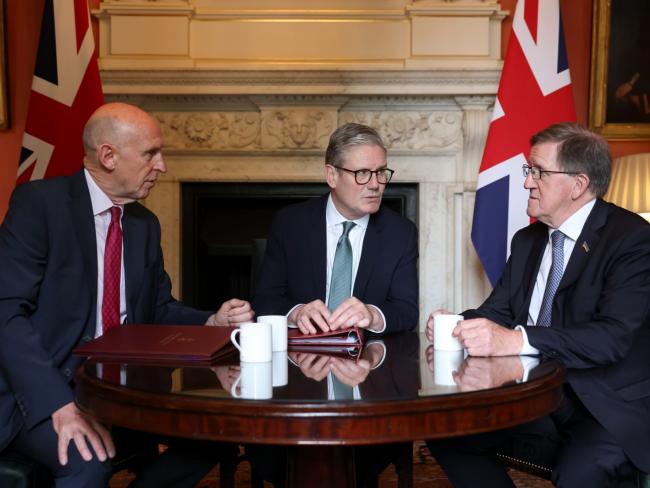4 April 2025

On 16 July last year, newly elected Prime Minister Keir Starmer and Defence Secretary John Healey meet Lord Robertson, former NATO Secretary General now appointed to head up the defence review. Photo Simon Dawson / No 10 Downing Street via Flickr (CC BY-NC-ND 2.0)
The idea of conscripting young workers into the armed forces keeps coming back. It might seem a remote possibility, but the ruling class wants to normalise the discussion – to make the idea acceptable.
A meaningful discussion about “defence of Britain” isn’t possible without the active involvement of the working class. Workers should take charge of the discussion and ask our own questions. The alternative is imposition of preparations for war.
Leap
On 28 March the current government’s plans for discussing conscription took a leap forward with the publication of a House of Commons Library briefing for MPs. Entitled Conscription and National Service in the UK, it includes much on the history of conscription. But the clear purpose is to “look at historical national service and conscriptions in the context of the current discussions about the defence of the UK”.
The possibility of national service and conscription will be in the minds of MPs preparing for the upcoming parliamentary debates on the new national security strategy and the new strategic defence review.
Cornerstone
These reviews, initiatives of the incoming Labour government a few weeks after it took power, are entirely bound up with Britain’s membership of NATO. John Healey, the defence secretary, said that NATO is the “cornerstone of UK and Euro-Atlantic security”. And the new security strategy will be pitched at the NATO summit this June.
This is part of a coordinated attempt to raise the “conscription conversation”. In January 2024, General Patrick Sanders, then head of the British Army, warned ministers that they may need to mobilise the nation and spoke of a need to “change the public’s mindset”. He also spoke of “a pre-war generation”.
Proxy
The “conscription conversation” is a barely disguised proxy for a war making conversation. So far the working class has been avoiding the discussion, possibly hoping it will go away. Or else focusing on jobs in the defence industry.
‘The defence of Britain is about more than conscription.’
The defence of Britain is about far more than conscription. For instance, our ability to manufacture steel and to ensure energy and food security – and much more. And that’s even before talking about whether sending young men and women to fight in Ukraine or the Middle East is about defending Britain or defending capitalism.
Unpopular
Peacetime conscription, National Service, ran from 1949 until 1960. Women were exempt, but current talk about conscription clearly includes them. National Service was unpopular and attempts to bring it back attracted opposition.
Since the 1960s successive governments have argued that a highly trained, professional armed force staffed by volunteers is the best way to provide a defence of the United Kingdom and not conscription. If defence is truly the aim, has anything changed?
Cloak
Any nation needs armed forces to defend itself. But over the last 65 years those British professional forces have been placed in harm’s way in wars – in Iraq and Afghanistan for example. Is the idea of conscription no more than a cloak to boost numbers for such adventures?
Recruitment to the professional armed forces has suffered an unprecedented slump. It was outsourced – initially to Capita, which attracted much criticism. Now Serco has just won the new contract – for £1.5 billion over 7 to 10 years.
